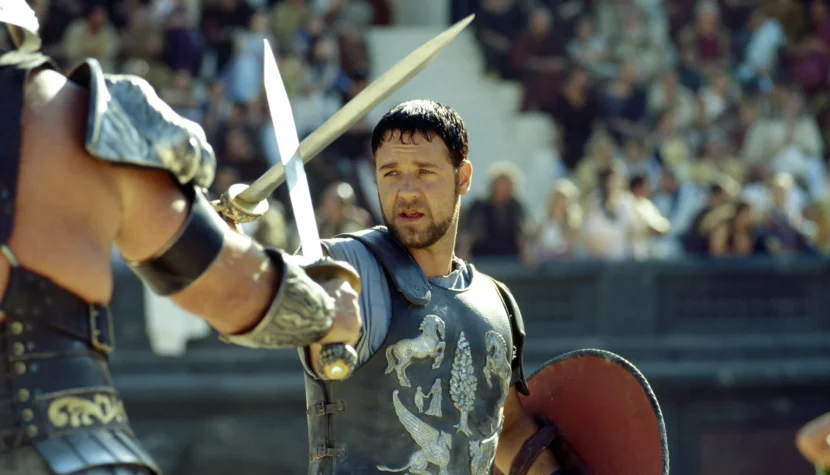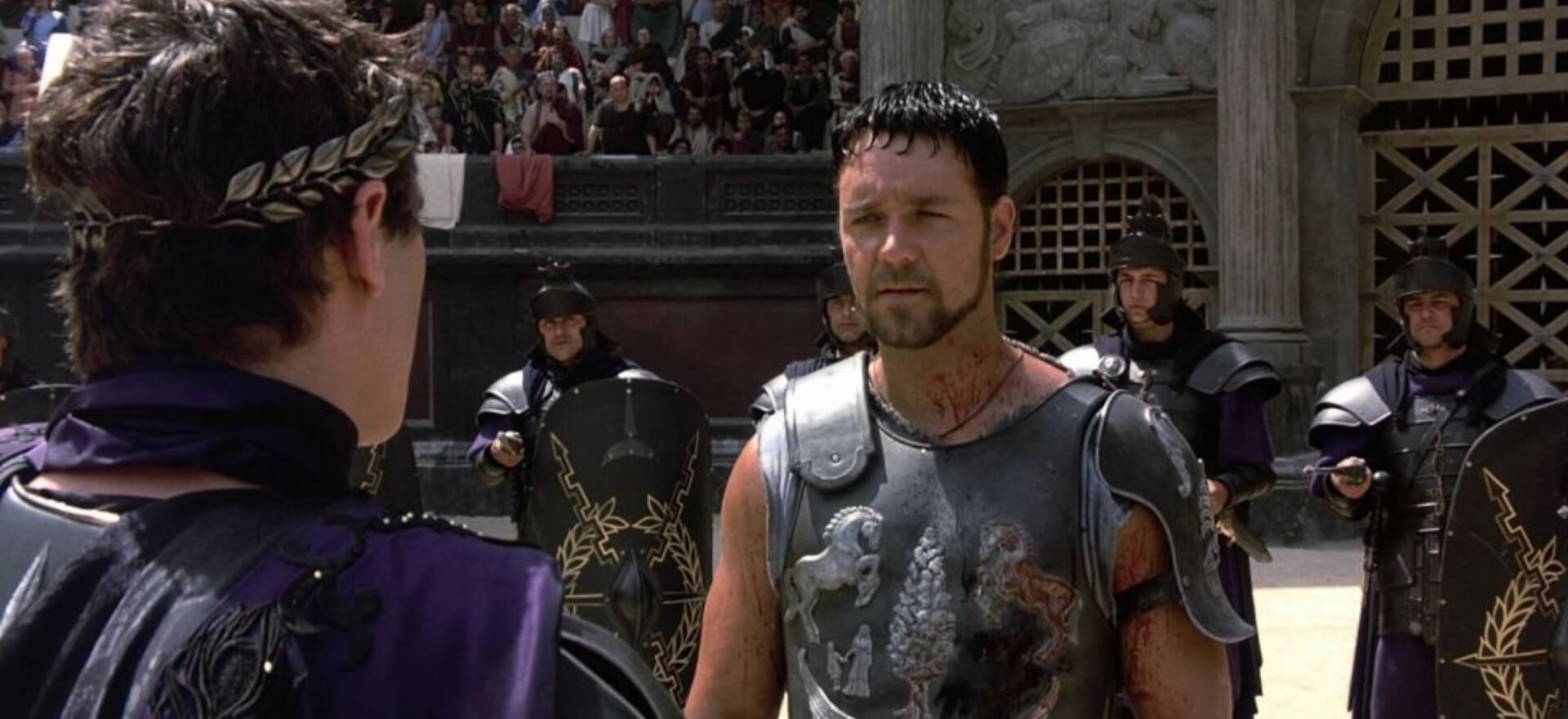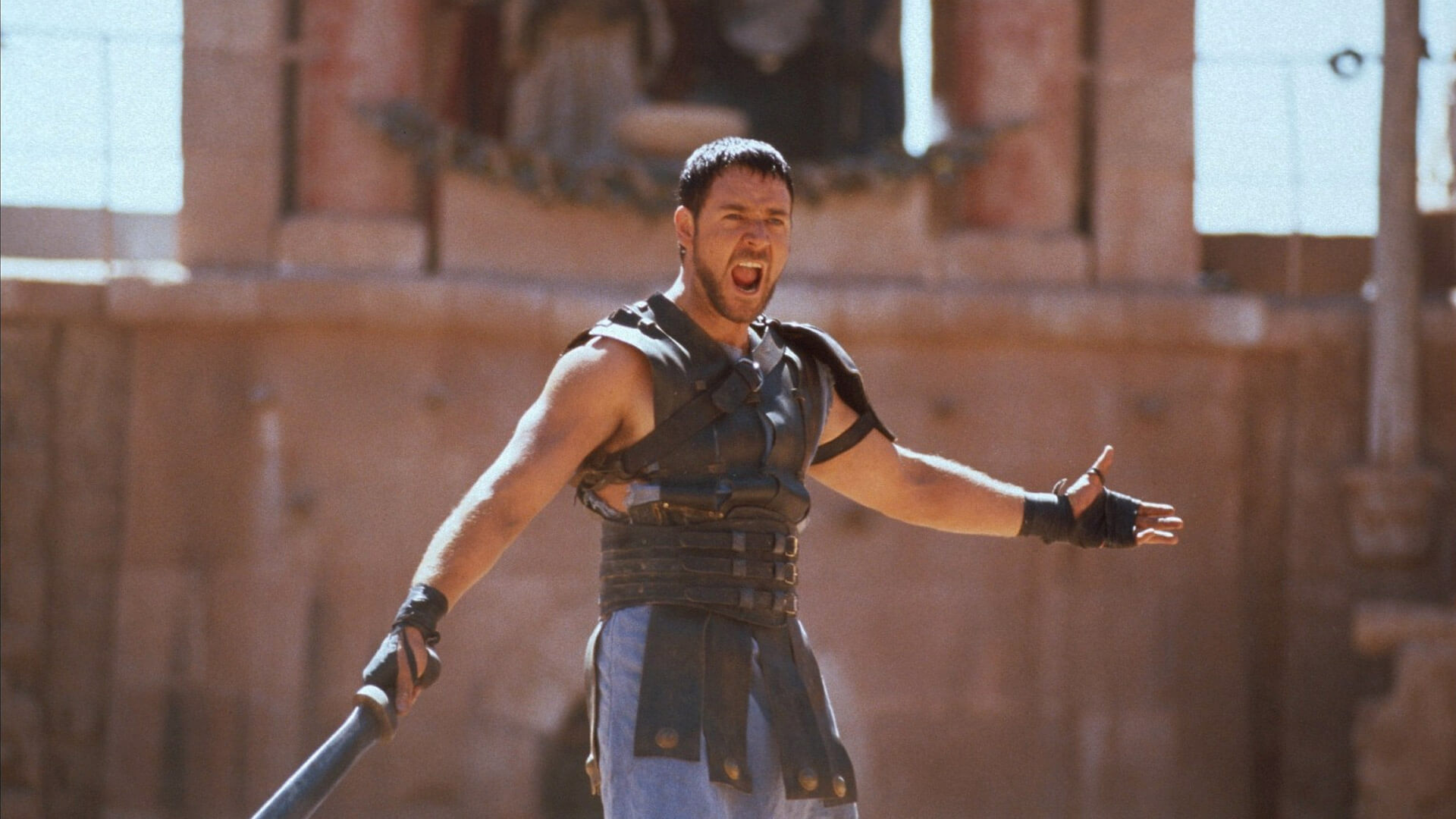Is “Gladiator” already a TIMELESS classic?

Since my first viewing, I believe “Gladiator” has an infectious energy. This is evident in the finale, where the reigning emperor, Commodus, faces off against the people’s champion, Maximus. The resolution of their conflict delivers the right amount of satisfaction, lifts the spirit, but also conveys a sense of climax, blending spirituality with physical suffering. The elevated conclusion does not seem exaggerated. It is earned through the groundbreaking events in the political dimension and the scale of the titular hero’s ultimate sacrifice. Ridley Scott has proven more than once that he is a master at handling pathos.
Though Ridley Scott’s film is already a fully-fledged sandal classic, it is also a child of postmodern cinema from the 90s.
Yet, from the very moment Maximus drives a dagger into Commodus’s neck, I prefer the brief, aesthetically over-the-top (kitschy?) moment when the two, surrounded by Praetorians, ride out into the Colosseum arena. Blinding light and rose petals contrasting with the bright red glow. The grand musical arrangement and the roar of thousands of voices: Maximus! Maximus! Maximus! Together, it forms a spectacular audiovisual composition, providing adrenaline akin to what football players must feel listening to the Champions League anthem before a final.

Even Commodus realizes the dramatic potential of this scene. It is a long-awaited climax: one to be proudly participated in and savored. The young emperor revels in it, staging it, consistently raising the stakes and level of difficulty (a bit of torture, a dagger in the opponent’s ribs). “Gladiator” cannot be read merely as another cinematic spectacle, successfully reviving Hollywood’s trend for Ben-Hurs, Cleopatras, or Spartacuses. While Ridley Scott‘s film is already a bona fide sandal classic, it is also a child of postmodern cinema from the 90s, embracing metatextual narrative and eagerly winking at the audience.
Commodus will repeatedly assume the role of director. In the finale, he steps onto the stage, but beforehand, he places two figurines on a model of the Colosseum, foreshadowing the inevitable conclusion well in advance. Maximus shouts the famous “Are you not entertained!?” addressing not only the spectators in the arena but also those comfortably seated in movie theaters. The Roman general wants to know if enough blood has been shed and if the brutality is just right or if another limb should be severed. Elsewhere, we encounter a colossal statue of a foot. It’s a tribute to the gladiators’ profession, but also a clear signal that everything may be nothing more than a Grand Staging. The characters could merely be pawns on a board, and the entire intrigue a preprogrammed spectacle. “Gladiator” is modern cinema, although not manifesting its modernism as overtly as more famous productions by Lynch, the Coens, or Tarantino.
I love the first act of “Gladiator” set in Germania. It is an exhausting study of characters, highlighting numerous conflicts of values and interests. Mentally distressed after losing her husband, Lucilla cannot escape her toxically enamored brother. Despotic, obsessively ambitious, and insecure (lack of power, lack of love, lack of respect, lack of courage) Commodus is a character defining Joaquin Phoenix’s image, an actor specialized in nuanced and emotionally fragmented roles.

Equally interesting is the weary and bitter Marcus Aurelius, whom we quickly part with, but whose presence will be felt until the last minutes of the film, serving as a constant reference point. The opening of “Gladiator” brilliantly sets the action in motion, evoking associations with ancient tragedy, and in its execution, it set new standards for how a battle sequence in historical cinema should look. Similarly, for 20th-century military conflicts, the famous opening of “Saving Private Ryan” was a benchmark.
Maximus can initially be seen as a steadfast, good character devoted to his convictions. However, throughout the film, the titular hero subtly evolves. Over time, aside from personal vendetta, the broader, political significance of his decisions becomes increasingly important. From an internally torn soldier, he transforms into a symbolic figure. I have never viewed Maximus as a mere mortal but more as a mythical character. Like Hercules or Achilles before him, he is existentially suspended between the Now and Eternity.
Is it still too early to consider “Gladiator” a timeless film? An Oscar for Best Picture certainly helps achieve this status, but it’s not the most important factor. Crucial is its constant presence in TV schedules and the continuous re-releases in every new format, as well as its mention in discussions and rankings organized for critics and viewers alike. The images of Maximus or Commodus automatically associate with specific values and a set of traits, and calling some scenes iconic does not seem an exaggeration. I cannot deny “Gladiator” its significant (pop) cultural resonance. Nevertheless, I would be cautious in labeling “Gladiator” as flawless and completely fulfilled cinema. However, we know well that the history of cinema in the public consciousness is not written solely by impeccable masterpieces.

